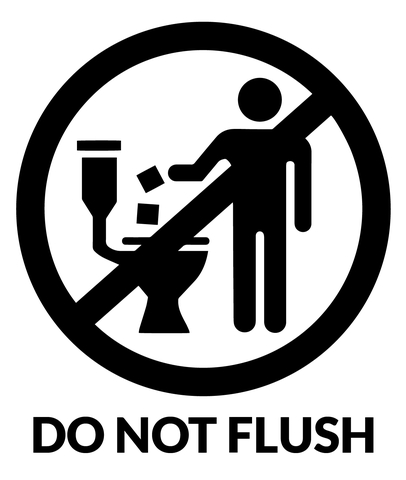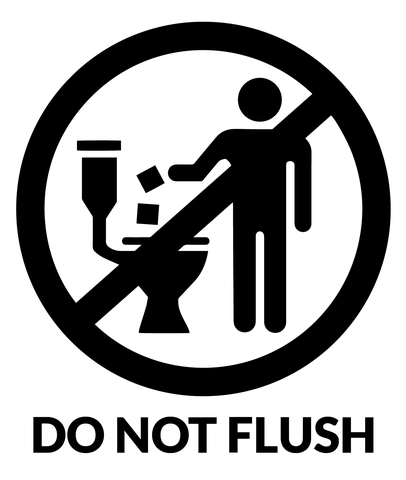SACRAMENTO--(BUSINESS WIRE)--Today, the Responsible Flushing Alliance (RFA) accepted a resolution issued by the office of California Assembly Member Richard Bloom to recognize July 1 as “Flush Smart Day.” The inaugural observance to take place Friday will also mark the official launch of RFA’s consumer education campaign aimed at improving proper flushing habits in homes and businesses in California and the across the nation.
California’s Proper Labeling of Wet Wipes law (Assembly Bill 818), was passed last October through the leadership of Assembly Member Bloom, establishing requirements for the proper labeling of disposable wipes with the “Do Not Flush” symbol and support of a consumer education campaign. In accordance with the law, RFA officially launches its #FlushSmart campaign, which includes a series of educational materials, in both English and Spanish, and resources for consumers, educators, wastewater agencies and other stakeholder groups regarding what should not be flushed down the toilet.
“At times of drought and lower flows in our state, maintaining proper flushing habits is paramount to helping protect our critical infrastructure,” said Bloom. “These efforts, as well as the debut of the 'Do Not Flush' symbol on product packaging, will help protect our communities’ precious groundwater and other fresh water sources from potential contamination.”
Washington, Oregon and Illinois also have similar labeling laws for non-flushable wipes. This ensures that consumers across the country will have the opportunity to learn about what not to flush by seeing the “Do Not Flush” symbol prominently featured on non-flushable wipes packaging.
“We are pioneering a first-of-its kind educational initiative to fix a very simple but serious issue in the state of California and other parts of the country,” said RFA President Lara Wyss. “Nearly 60 percent of consumers indicated in a 2021 survey that they have disposed of something non-flushable in the toilet during the previous year. That is why 'Flush Smart Day,' and the #FlushSmart campaign, is so critical in helping to reverse this negative trend impacting our wastewater systems.”
The campaign launch showcases the collaboration among government, wastewater, environmental, and industry groups to create meaningful solutions to problems caused by consumers flushing the wrong products down the toilet. The RFA and its members are fighting to spread greater awareness of the “Do Not Flush” symbol, which is now prominently displayed on non-flushable wipes packaging.
“By educating Californians to practice smart flushing habits, we can influence a decrease in undue pressure on our pipes, pumps and waste treatment plants so they can safely run at optimal levels and keep waste in its place,” said Adam Link, Executive Director, California Association of Sanitation Agencies
Support for the #FlushSmart educational campaign includes those who helped spearhead the law, including Assemblymember Bloom, the California Association of Sanitation Agencies (CASA), and the National Stewardship Action Council (NSAC). RFA’s campaign represents the industry’s first national consumer education effort focused on what not to flush.
“Removing plastics from our waterways is of the utmost importance to preserving our environment and drinking water,” said Heidi Sanborn, Executive Director, National Stewardship Action Council. “Prominent Do Not Flush labeling is critical to providing 'truth in labeling' so the public knows these products belong in a waste bin, not the toilet.”
Background:
There are four states that currently have labeling laws related to non-flushable wipes: Washington, Oregon, Illinois, and California. All of the laws go into effect on July 1.
In October 2021, Governor Gavin Newsom signed AB 818 by Assemblymember Richard Bloom into law, requiring all packaging for diaper wipes, cleaning wipes, cosmetic wipes, among others, to display clear “Do Not Flush” labels. The bill is the result of a three-year effort between representatives from wastewater and product stewardship groups and wipes manufacturers to address an urgent pollution problem that has plagued public wastewater infrastructure. The legislation established disposal labeling requirements for wet wipes packaging and requires manufacturers of wipes to educate the public on the impacts of flushing wipes improperly.
Campaign Information:
The RFA invites everyone to help celebrate the milestone of establishing a first-of-its-kind consumer education campaign and learn more about the “Do Not Flush” symbol and #FlushSmart campaign. For more information about the campaign in California, visit https://flushsmartcalifornia.org or for general educational information about RFA, visit https://flushsmart.org.
About Responsible Flushing Alliance
The Responsible Flushing Alliance (RFA) is a 501(c)(6) non-profit organization dedicated to consumer education focused on what not to flush. RFA’s goal is to change consumer behavior to help reduce damage to our nation’s sewage systems caused by objects and materials not designed to be flushed. Member companies supporting RFA include: Andritz, Albaad, Clorox, Dude Products, Dukal LLC, Essity, First Quality, Glatfelter, GOJO, Johnson & Johnson, Kelheim Fibres GmbH, Kimberly-Clark, Nehemiah Manufacturing, Nice-Pak and PDI, Papel Aralar, Procter & Gamble, Rockline Industries, Sellars Nonwovens, Suominen Corp., Spartan Chemical, and Reckitt.
About the California Association of Sanitation Agencies
CASA represents more than 125 local public agencies engaged in the collection, treatment and recycling of wastewater and biosolids to protect public health and the environment. Our mission is to provide trusted information and advocacy on behalf of California clean water agencies, and to be a leader in sustainability and utilization of renewable resources.
About the National Stewardship Action Council
The National Stewardship Action Council is a network of committed proponents comprised of governments, non-government organizations, businesses, and consumers who advocate that producers fairly share responsibility in a circular and equitable economy.





